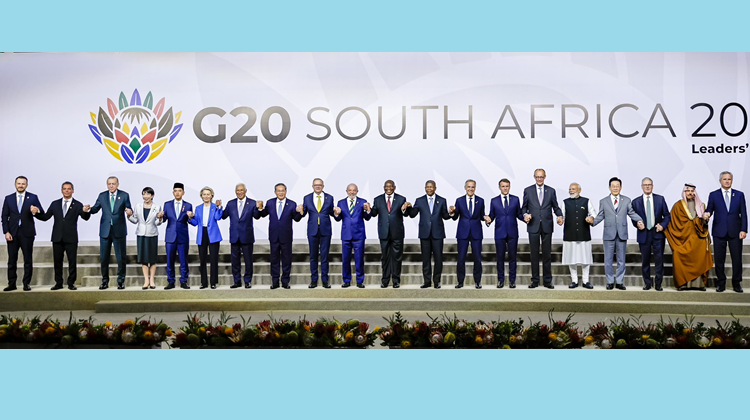A digital revolution on Africa’s terms

African countries must fast-track efforts to address the reach and affordability of digital technologies that connect them with the world.
Digitisation is upending familiar ways of being, engaging, and transacting at lightning speed. As the physical and virtual domains converge into a new hybrid world where reality is no longer defined by the distinction between the tangible and intangible, societies, polities and economies are being irrevocably altered.
Digital innovation is moving fast, and countries not only have to contend with the procurement and deployment of enabling infrastructure, but also with the normative and regulatory implications of the technologies that underpin it. While they hold vast potential for disrupting existing relationships that have locked states, particularly those in the Global South, into unfavourable economic dependencies, the novelty of these technologies also makes societies vulnerable to potentially unintended, detrimental consequences.
This dual challenge of adoption and regulation is rapidly making its way up the African Union’s (AU) policy agenda. The Fourth Industrial Revolution, underpinned by the force of digitisation, in theory holds the prospect for technological leapfrogging that could see Africa shed its peripheral role in the global economy. As such, policymakers continent-wide are increasingly interested in the practical ways specific sectors can benefit from the switch to digital.
Its potential, if managed correctly, is indeed vast, as Rob Floyd and his colleagues from the African Center for Economic Transformation (ACET) point out on this platform. Adding further policy impetus to this drive is the African Continental Free Trade Area (AfCFTA) agreement’s intention to create a digital single market that would enable the free flow of digital transactions across the continent’s borders.
But the gap between aspiration and the actual conditions that should enable it remain substantial. Africa’s digital divide is vast, with only 43% of Africans having internet access, compared to the 66% global average. Access is impeded by the lack of infrastructure. But even in areas where incremental progress is being made in terms of reach, cost factors still impede the prospects for mass connectivity. Combined, these obstacles to access mitigate against the growth of big data ecosystems required for a thriving digital economy or effective government services platforms.
Digitisation is upending familiar ways of being, engaging, and transacting at lightning speed
If they are, therefore, to leverage the potential of digitisation and thrive in a rapidly changing global environment, African countries will have to upscale and fast-track efforts to address the reach and affordability of digital technologies that connect Africans with each other and the rest world.
However, this accelerated pursuit can’t occur within a regulatory void. Without enforceable national frameworks that govern the responsible use of new technologies, core rights of citizens, such as privacy, can be violated. Equally, in the absence of enforceable continental frameworks, it will be difficult to pursue the creation of a coherent, integrated digital single market as envisaged in the AfCFTA agreement.
The development of these frameworks is not without complication. Ideally, they should be oriented towards the creation of an enabling environment for Africa’s digital transformation on its terms and according to its needs, instead of a digital duplication of the continent’s current subsidiary position in the global economic pecking order.
However, within the digital realm these norms are typically being shaped by the behaviour and influence of the large tech giants that are predominantly from the United States (US) (e.g. Google, Facebook, Amazon, Microsoft and Apple) and China (e.g. Tencent, Alibaba, Baidu and Xiaomi).
Recognising the future potential of Africa’s youthful and rapidly urbanising market, companies in both countries have in recent years ramped up their presence and expenditure across the continent. In the absence of any meaningful African competition, this has given rise to fears of what some have referred to as a new form of digital colonisation that could shape the African economy in the image of either of the two tech superpowers.
Africa’s push for digitisation coincides with a time of heightened international geopolitical tension and suggestions of a decoupling in the global economy – roughly along the lines of democratic and authoritarian states – with the US and China positioned at opposite ends. Increasingly this dynamic is also becoming evident in the digital economy.
Eight years after its adoption, only 14 countries have signed the Malabo Convention, and eight have ratified it
Some, for example, suggest that the digital component of China’s Belt and Road Initiative, the Digital Silk Road, dovetails with its leadership ambitions in the setting of global digital governance norms and standards. In the West, such developments are being viewed with growing suspicion of being part of a larger authoritarian threat to a free and open internet. The side-lining of Chinese tech giants, like Huawei, by the US and several Western European countries in recent years has been symptomatic of this concern.
Developments such as these have given renewed impetus to transatlantic cooperation in breaching fundamental differences between Europe and the United States on key sticking points. For example, data privacy and EU competition policy aimed at tempering the market dominance of US tech behemoths like Meta Alphabet, Amazon, Microsoft, and Apple.
The importance of the global digital agenda was also underscored by the prominence it was given at the Global Summit for Democracy in December 2021, as well as its core emphasis in the Declaration for the Future of the Internet in July 2022. Initiated by the Biden presidency and endorsed by a host of Western-aligned democracies, both sought to cement a democratic and human rights-centred digital government approach as an alternative to state-centred, authoritarian alternatives.
Pieced together, events such as these suggest that geopolitics is developing a distinct digital dimension with implications for technological interconnectedness of supply chains and polities. Put differently, it does posit a potential scenario wherein distinct digital spheres of influence with limited interoperability exist alongside each other.
What is the relevance of this for Africa’s digital transformation? As the Institute for Security Studies’ African Futures and Innovations head Jakkie Cilliers contends elsewhere on this platform, referring to the current global turmoil, Africa is again becoming a battleground for big power interests and influence. This competition is already playing itself out in the digital domain as China, the US, and increasingly also the EU, vie for influence in Africa’s digital development.
Africa’s push for digitisation coincides with a time of heightened international geopolitical tension
While Chinese companies, with the support of the Chinese state, are currently leading the race in the delivery of network infrastructure, US tech giants have ramped up their presence in other areas, such as the provision of undersea cables that connect these networks with the rest of the world. The US has also been the driving force behind the G7’s Build Back Better World initiative that seeks to mobilise private sector capital and development finance for low- and middle-income countries in four target areas, including the deployment of digital technologies.
Although not a digital power per se in terms of the size of its tech industry, the scale of the European market has allowed the EU to carve out a niche as a pivotal global player in the realm of domestic and cross-border digital regulation under the broad banner of trustworthy and human-centred tech. Its General Data Protection Regulation has become the global standard for data protection legislation, while the more recent Digital Markets Act and Digital Services Act are set to become equally influential in terms of regulating competition in the digital economy and the protection of users and consumers of digital services respectively.
The European regulatory experience has specific significance to Africa as it similarly faces the challenge of integrating and harmonising regulations of sovereign states and, as a result, there has been extensive AU-EU collaboration in this regard. But regulatory support may not be sufficient to mobilise longer-term influence. Hence EU commitments on the mobilisation of private investment in Africa’s digital infrastructure in terms of its Global Gateway initiative cannot be seen in isolation from Europe’s broader attempts to mobilise sway in the shaping of Africa’s digital environment.
At a time when African states need to speed up their drive towards digital integration, individually and as part of a continental collective, they will have to be discerning in their choices. Because the present moment offers unique opportunities to alter the continent’s economic development trajectory, it needs to be used on Africa’s terms and be aligned to its aspirations. As digital ecosystems are developed from the ground up, path dependencies are created, over time defining the parameters for future change. Merely copying strategies or opting for the cheapest infrastructure now will therefore come with a cost in the long term.
But equally important is the additional narrowing impact that a digital decoupling scenario could have on the range of options. An over-reliance on the resources or expertise from a single digital power could lock countries into distinct economic spheres of influence. These would not only result in dependencies and vulnerabilities, but also negate efforts towards continental digital integration, such as the creation of a digital single market.
While infrastructure may be lagging, African countries have made headway in the development of regulatory environments. A recent survey shows that most have by now developed digital agendas aimed at guiding their respective digital transformation initiatives. Steady progress is also being made at the AU level. In 2014 it adopted the Convention on Cyber Security and Personal Data Protection (the Malabo Convention), which sets out broad values and objectives for digital development in Africa.
The adoption of the Digital Transformation Strategy for Africa (2020-2030) in 2020 has been equally significant in terms of outlining a roadmap for continental digital transformation aligned to Africa’s development objectives, and asserting the broad principle of digital sovereignty for African states. The publication of the AU Data Policy Framework in 2022, which provides guiding principles for the treatment of data in Africa, marked yet another milestone in the crafting of the continent’s regulatory architecture.
These frameworks provide a solid foundation to build on, but much will depend on the commitment and ability of individual countries to implement them consistently. Also at the continental level, the quality of oversight and compliance would be critical to ensure coherent implementation. On both scores more urgency is required.
Eight years after its adoption, only 14 countries have signed the Malabo Convention, and eight have ratified it. This doesn’t set a positive precedent. As the rate of technological change continues to accelerate, it’s important to keep up and ensure that the values and intended objectives of these measures find bearing in polities across the continent, lest they be overrun technologies that are more harmful than useful to societies.
While they may not seem urgent right now, complacency must not lead to a missed opportunity.
This post partially draws on insights from a briefing paper on SADC's digital politics co-authored with Dr Deon Cloete and Ms Ndeapo Wolf. The paper will be launched on 30 November by the South African Institute of International Affairs.






